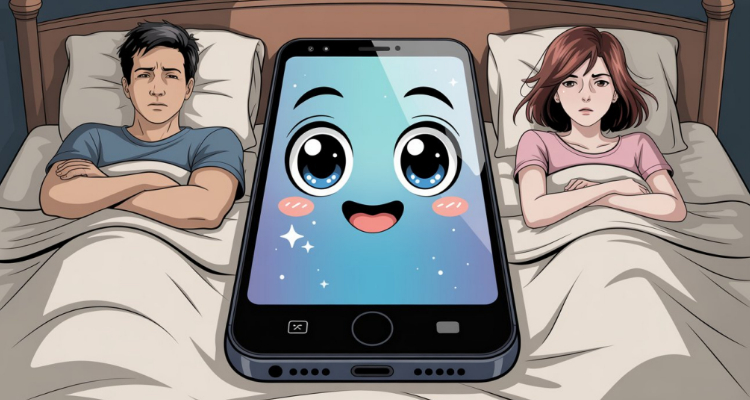Why Smartphones Are the Last Thing You Want in the Bedroom
Find sexier ways to avoid Phonedemic blues

I’ll admit it, after my deep dive into AI and human relationships, I’m just that close to self-identifying as a Luddite of Love!
But it’s not the rise of sexy chatbots that bothers me, it’s the ubiquitous smart phone and its up-close interference with all things personal, including dates, conversations, and pre-or post-coital moments that should be savored—sans tech—just a little bit longer.
In a recent piece written for The Standard, Sophie Peachey gave voice to one of my most puzzling irritations, the jarring impact of frequent cellphone use even during time supposedly devoted to emotional and sexual intimacy, once quaintly known as being together. Peachey writes:
It’s this incorrigible screen addiction that’s quietly eroding our sex lives. At this age, we’re meant to be nubile and insatiable, yet all too often what’s whetting our appetite isn’t our partner, but the dopamine shots of AI slop and YouTube Shorts.
The Standard article discusses sextoy retailer Lovehoney’s Gen Z study, which found “prolific phone use fuels relationship friction, with 18% of Gen Z and Millennial couples citing it as the biggest cause of arguments.”
Other findings include: 35% of Gen Z respondents said phone use could diminish their interest in partner sex; 56% said this was because the phones were distracting; 40% said this had a negative impact on quality time. Probably the most shocking finding was “18% of Gen Z Brits check their phone during sex.”
According to Peachey, an unnamed Lovehoney source refers to the overuse of smartphones as the phonedemic.
Meanwhile I’m wondering, sexologically of course, what exactly ARE the phone-friendly sex positions?
It’s not just Gen Z

However, I’ve got news for Peachey and Lovehoney: lovers in other g-g-generations grapple with this problem too, even those not quite as “nubile and insatiable” as they used to be.
In fact, some people still alive—and still sexually active in spite of having one foot in the grave—remember when phones really were just for talking and phone calls could even be ignored. People were even known to take the phone receiver off the hook, thus blocking intrusions of the outside world. What a concept!
You can use them a lot, just don’t use them ALL the time

To identify how smartphone use can damage sexy and romantic situations, we first have to consider the obvious ways they help. They’re not just used for keeping in touch with lovers—also known as talking—but also for explicit purposes like sexting, phone sex (see talking, above), and sending spicy selfies.
People use smartphones to access dating sites, adult entertainment, sexual ed and wellness information, and can use them to order sex products, and even use them to link with interactive sextoys. Given smartphones are so handy, and we use them so often for sexual purposes, it might not seem all that egregious to reach for the phone before dinner is over or the afterglow subsides.
The only thing is, there’s another person right over there who presumably would rather you talk with them, or at least tap on the keyboard they’ve scrawled on their chest/breast with a Sharpie in order to get your attention, otherwise they wouldn’t be in bed with you, would they?
Are phones a form of self-soothing behavior?

Before I delve deeper into the potentially negative sexual and relational aspects of this topic, I want to propose a hypothesis: that some people may be using smartphones as self-regulation devices to manage anxiety, boredom, pain, or to handle the effects of over–or under–stimulation. In other words, stimming.
This is a word often associated with autism and ADHD, but people of all forms of neurologies have engaged in some form of stimming—including tapping, nail biting, hair twirling, lip chewing, scratching or rubbing skin, and squeezing objects—when under stress.
Me? I find myself biting my lower lip, even while writing this article. But I digress…
In other words, that itch to check the phone often enough to seem disruptive—might not be a sign of rudeness, dismissiveness, cluelessness, or devaluation of the other person. It might have more to do with an urgent need to calm an overwrought nervous system.
Unfortunately, without careful observation, mutual understanding, and explicit conversation about phone boundaries, this form of habitual self-soothing may continue to cause hurt feelings and resentment, leading to an erosion of the relationship.
But what could cause those hurt feelings and resentments? It’s partly the nature of the phone itself. It is a communication device, after all, and communication is something that helps foster emotional intimacy, and feelings of being mutually valued.
There’s also an etiquette aspect: pulling out the phone at the wrong time can be just plain rude. The nonverbal message is “you’re boring, this is more interesting.” So when one person turns too often, or at the wrong moment, to the “other”—in this case, the phone—the emotional connection is cut short and the quality of what went before—even if it was super hot—may seem diminished.
If you suspect that you—or your lover—may be using a smartphone to sometimes self-regulate, observe other patterns of smartphone use and other kinds of emotionally soothing behaviors. Notice when these behaviors happen and how long they last.
If you are able, express a willingness to discuss this context, and consider using a substitute object or activity more appropriate for self-regulation during intimate times. You may also need to negotiate other boundaries or conditions such as not using the smartphone during meals or in the middle of conversations. It would also be a good idea to discuss circumstances when it is perfectly okay to hang out with technological devices instead of engaging with lovers.
Sex, stress, and the soothing effects of touch

The Sentinel article references research done by LoveHoney, Of course, other researchers have explored the impact of technologies on relationships, intimacy, and sex.
Commenting on a 2022 Gen Z Lovehoney survey, Dr. Justin Lehmiller writes:
Stress is one of the biggest libido killers—and it can also undermine sexual performance. So in order to have good sex (and even be in the mood for sex), it’s important to find ways to relieve stress and be in the moment. This is essential for orgasm. For many people, being able to “let go” is crucial for climax. One sexual difficulty that distinguishes Gen Z from older adults is that Gen Z reports more difficulty orgasming. So, for young adults, exploring relaxation, mindfulness, or other stress-reduction techniques may be especially important for getting to the peak of pleasure.
Lehmiller mentions mindfulness and perhaps that is an easy solution to impulsive smartphone use. Lovers might mindfully refrain from reaching for the phone to check texts or access the internet during dates and cuddles, and reaching for it almost immediately after intimacy, and especially not using it during any kind of physically proximate partner sex.
As mentioned above, lay some ground rules. For example, if you absolutely must check something, alert your partner first, apologize for the interruption, promise to not make it a habit, and put the thing down quickly when done.
After, be sure and reach out to your partner. After all, a good cuddle is often the best self-soothing strategy we’ve got. You’ll both be happier for it, no matter what generation you’re in.
Image Source: A.R. Marsh using Ideogram.ai

















